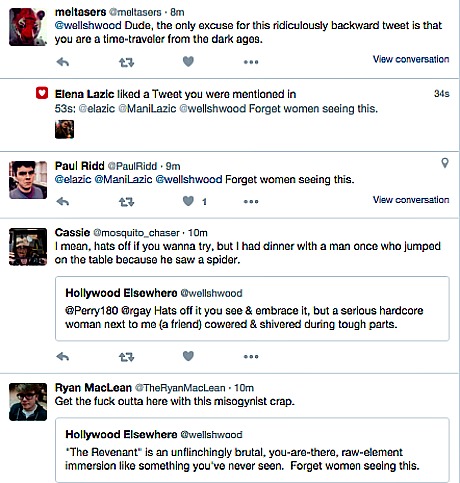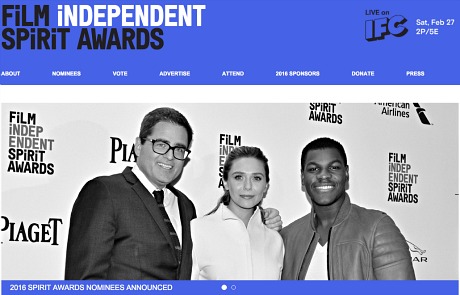I’ve noted a few times that I prefer the kind of film score that seems to be watching the movie with you and expressing what you’re feeling as the story progresses. (Examples: Spotlight, Moneyball.) The other kind announces the emotional intention or goal on a scene-by-scene basis and more or less instructs you how to feel. Ludwig Goransson‘s Creed score is one of the latter, but it’s an arresting and often rousing example of this approach. Goransson, 31, is so with the film and feeling the current so strongly that he reminds you of old-school composers like Max Steiner or Franz Waxman. His music isn’t dancing in step with or augmenting the movie as much as a character unto itself — a kind of cheerleader that’s saying to the crowd, “Pay attention, this matters, ya gotta feel the feeling!” For what it’s worth, it’s a very stirring score of this type.
Assured Creed Is A Hit; Stallone Is A Lock For Best Supporting Actor Nom
Ryan Coogler‘s Creed, which I paid to see last night at the AMC Century 15, is the second high-quality, popular-with-the-proletariat formula flick to have elbowed its way into the award-season conversation this year (following Ridley Scott‘s The Martian). We’re definitely talking Sylvester Stallone for Best Supporting Actor…but will he campaign? (He’s delivered three commendable performances now — young Rocky Balboa in Rocky, 60ish Rocky in Creed and John Rambo in Ted Kotcheff‘s First Blood.) Creed is not so much a Best Picture or Best Director contender because it mainly follows the expected ambitious-young-boxer saga while tributing the first Rocky film. It’s not breaking any new ground, but it’s the first really good Rocky film in 39 years.
But it’s very well done within genre perimeters, and well written as far as it goes, definitely well acted and even excitingly directed at times. Coogler has made his sophomore bones with this film, and is basically set for life (if he wants to milk it) as the black Sydney Pollack. And Creed has a spiritual sports current you can really dig into and ride upon — a serious feeling of esprit de corps among sports-loving Philadelphians and particularly the scooter and moped-riding locals who live in the nabe where Michael B. Jordan‘s Adonis Creed lives and trains. This is the kind of solid, pulse-quickening sport-formula film that Joe Popcorn lives for. And it’s definitely a hit. People in the theatre applauded when Stallone came on screen, and they applauded when Ludwig Goransson‘s music cued up the traditional Rocky theme. They were into it and happy when it was over, and so was I as far as it went.
Hemingway’s Peak
I can rent a gleaming Technicolor pig-heaven version of Sam Wood‘s For Whom The Bell Tolls (’43) on Amazon Prime for only $4 bills, and it’s the restored 166-minute version with overture and entr’acte. Looks and sounds terrific. Why, then, did I just spend $13 and change for the recently popped German Bluray? Because as happy as I am with hi-def streaming these days, I feel a profound kinship with physical media and so I re-invest now and then, not out of desire or necessity but sentiment — because I don’t want it to go away.


The Morons Are Due On Maple Street
I’ve posted the following in the Guardian comment section following Andrew Pulver’s article: “This was over four lousy words on Twitter. FOUR WORDS! Sloppy of me, granted, but I posted a mea culpa yesterday, or a few hours after this blew up: ‘Agreed — I shouldn’t have said that. ‘Forget women seeing this’ is a gross simplification. I’m down on my knees and whining like a little piglet. If I had given the matter 15 or 20 seconds worth of thought I would have rephrased and qualified in some way. I’m not stupid, and I know that generalizations always get you into trouble.”


Continuing Malick Meditation: Tree Of Life & To The Wonder Go Hollywood
Life will repeatedly wound you, and profoundly disappoint you by the time you’re 13 or 14…jobs will disappear, lovers will leave you, pets will die, leaves will turn yellow and brown and fall from the trees so what the fuck? “There’s no one thing that’s true. It’s all true.” — Ernest Hemingway, For Whom the Bell Tolls. But you know what’s almost never “true,” or at least in the way Hemingway and other considerable persons have defined the term over the millenia? Fucking Twitter.
“Any honest person who’s kept up with Malick since his return to filmmaking in 1998 (and who has contemplated the three Malick films shot by Emannuel Lubezki — The New World, The Tree of Life and To The Wonder) would have to admit that Malick has all but destroyed his once-potent mystique because he’s placed too much emphasis on the purely visual. He doesn’t give enough consideration to script and dialogue matters, and seems to have more or less abandoned conventional narrative. This plus his now-customary prolonged fiddle-faddling in post-production has fed a growing notion that Malick is a gifted but flaky eccentric — i.e., Mr. Wackadoodle.” — posted in December 2013.
Scent of Aggression
As I noted on 11.17, I was disappointed with my under-energized, under-prepared handling of my Jane Fonda sit-down. David Poland, I feel, made much better use of his time with her. I just can’t do that hammering thing he does. When someone gives you a really honest and well-phrased answer to a question, the natural impulse (mine, I mean) is to reflect and ruminate upon that answer. To dive in and swim around in it. But no reflective moments for Poland. He comes right back with another hammerhead question…beedly-beedly-bee-bee-bee?…and Fonda seems…what, slightly stunned that he’s not a go-with-the-flow, ponder-the-serenity type of guy? But she answers his questions and he gets a better interview. If I was the celebrity-artist in the chair and Poland asked me a series of rapid-fire beedly-bee-bee hammerhead questions, I would turn hostile after a while.
Valhalla
For me the most exciting Bluray announcement in recent days is the March 2016 release of Kirk Douglas and Richard Fleischer‘s The Vikings (’58) via Kino Lorber. The Vikings is one of the few large-format epic films (shot on 8-perf Technirama, the process used for Spartacus) still unreleased in Bluray/high-def. This will be the first time that a comprehensive, highly detailed capturing of Jack Cardiff‘s handsome cinematography will be viewable in over 55 years. In my book this as thrilling as Universal’s forthcoming Bluray of a restored One-Eyed Jacks, which was shot in VistaVision. Kino Lorber doesn’t do 4K as a rule but a 2k rendering would be nice.

“Mozart to Rimbaud to the Beats…”
The last time I saw Bob Dylan perform was at the Auditorium Theatre in Chicago in April of 2005, and he was into a kind of scat-singing back then and putting aside guitar for the keyboard. I loved the way fiddler Elana Fremerman (of Hot Club of Cowtown) kept making goo-goo eyes at Dylan, and loving the crisp, tight-sounding band. But I also remember feeling a little sad that Dylan didn’t sound like his ’60s records. He had long since stopped singing straight and plain and just, you know, hitting notes and massaging the phrasing like he did in D.A. Pennebaker‘s Don’t Look Back (now on Criterion Bluray). Because he can’t repeat himself, has to change, has to shift gears to stay fresh and alive. I get it but I still miss it.
Streisand’s Medal of Freedom Flinch
It was amusing just now to watch Barbra Streisand step up to receive the 2015 Presidential Medal of Freedom from President Obama at the White House, and to watch her facial expression flinch ever so slightly when the guy reading a few salutory words refers to her career having lasted “six decades.” In fact it’s lasted just over five decades (or not quite five and a half) with Streisand having begun to become known as a gifted singer in ’61, but who didn’t really get rolling until ’62-’63. The moment I’m referring to happens toward the end of this video.
Getting Clubbed Again By P.C. Twitter Goons Over Four Words
This morning I tweeted that Alejandro G. Inarritu‘s The Revenant, which I saw last night, is “an unflinchingly brutal, you-are-there, cold-wind, raw-element immersion like something you’ve never seen.” Because as beautiful as it is, it’s not a walk in the park, this thing. It’s rapturous, fierce, immersive, delirious…submerged in ice, arctic air, brutality…an ordeal of blood, agony, survival, snow, ice water, wounds and steaming horse guts.” If I’d just left it at that, everything would be fine. But because two women I saw it with reacted quite viscerally and with considerable discomfort (especially the one sitting next to me, a friend and a respected, high-level dp who’s been around and climbed her way to the top in a very tough business) and because a journalist friend told me The Revenant would totally freak his wife out, I added four words that got me killed on Twitter: “Forget women seeing this.”

Every time this happens, I feel like a wildebeest being surrounded and torn apart by hyenas or wild dogs. May I apologize for tapping out those words, or would you rather just continue to circle and bite and snarl and tear my stomach open, o ye fucking fang-toothed predators?
Agreed — I shouldn’t have said that. “Forget women seeing this” is a gross simplification. I’m down on my knees and whining like a little piglet….”wheee!…wheee!…I’m sorry…I’m sorry!” If I had given the matter 15 or 20 seconds worth of thought I would have rephrased and qualified in some way. I’m not stupid, and I know that generalizations always get you into trouble.
But if you had been watching The Revenant with a friend who was shielding her eyes every five or ten minutes and even going into a curled-over, fetal-tuck position at times, literally bending over and almost chirping like a chipmunk during the extra-violent or extra-gross scenes and being such a total candy-ass that I nudged her a couple of times (“Pssst…c’mon, show some respect for the filmmaker!”), what would you have been thinking? And what if you’d heard a fellow female journalist, sitting two seats away, call it “brutal“? And what if you’d been told by a fellow male journalist after the screening that his wife “wouldn’t last five minutes with this thing,” what would you be saying to yourself?
Film Independent Spirit Nom Predictions
Congrats to all the 2016 Spirit Award nominees, particularly Carol and Beasts of No Nation for having landed six each. Spotlight landed four noms plus a pre-determined Robert Altman award for ensemble acting. Best feature noms were handed to Carol, Spotlight, Beasts of No Nation, Anomalisa and Sean Baker’s Tangerine. And no Best Feature nom for Love & Mercy, which is 15 or 20 times the movie Tangerine is? Fuck is that about? Be honest: If Tangerine had been shot on a bigger budget with an Alexa HD instead of an iPhone 5, would it have even been nominated?

It seems to me that Cate Blanchett and Rooney Mara snagging Best Actress noms is a pushback to the Weinstein Co. narrative of Blanchett being lead and Mara supporting.
Here are the 2016 Spirit Awards noms with a few HE favorite and Likeliest To Win distinctions on a per-category, whenever-I’m-into-it basis:
Best Feature: Anomalisa (not a wisp of a chance), Beasts of No Nation, Carol, Spotlight (HE Favorite, Likeliest To Win), Tangerine (double forget it).
Best Director: Sean Baker, Tangerine; Cary Joji Fukunaga, Beasts of No Nation (2nd Most Likely Winner); Todd Haynes, Carol; Charlie Kaufman & Duke Johnson, Anomalisa; Tom McCarthy, Spotlight (HE favorite, Likeliest To Win); David Robert Mitchell, It Follows.
Best Screenplay: Charlie Kaufman, Anomalisa; Donald Margulies, The End of the Tour; Phyllis Nagy, Carol (HE favorite); Tom McCarthy & Josh Singer, Spotlight (Likeliest To Win), S. Craig Zahler, Bone Tomahawk.


